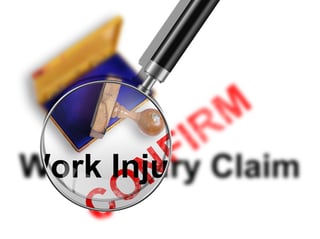
When it comes to determining compensability for workers’ compensation claims in our home state of Illinois, there are certain steps to take during the claim handling process to determine if the claim is compensable or should be considered for denial. In this article, we focus on common workplace injuries and what information should be obtained at the onset of the claim to determine if the claim is indeed compensable or will be denied under the Illinois Workers’ Compensation Act.
The most common type of workplace injury is known as the “specific” incident. This represents an on the job injury wherein there are a specific date, place and time of an injury. These injuries are generally covered under the Illinois Workers’ Compensation Act. Other types of injuries would include an aggravation of a pre-existing injury, repetitive trauma claims and occupational disease claims. Each type of injury requires a different approach when determining compensability.
Specific Incident
 When determining compensability for a specific incident, you need to determine if the employee was injured in the course and scope of their employment. An investigation with the employee’s supervisor and the employee will determine if the employee was injured while performing their regular duties. Video footage and witnesses to the event also assist in determining compensability. Bear in mind that simply because something occurred while at work does not necessarily equal “course and scope” of employment.
When determining compensability for a specific incident, you need to determine if the employee was injured in the course and scope of their employment. An investigation with the employee’s supervisor and the employee will determine if the employee was injured while performing their regular duties. Video footage and witnesses to the event also assist in determining compensability. Bear in mind that simply because something occurred while at work does not necessarily equal “course and scope” of employment.
For example, an employee who suffered a stress fracture to the foot while simply walking at work was arguably at no greater risk for that fracture at work versus at home, and the claim should be considered for denial. However, if that same employee was carrying a tray of parts while walking, you might conclude the added stress of carrying work-related items equals “course and scope” of employment.
Aggravation of Pre-existing Injury
The aggravation of a pre-existing condition may be compensable under the Illinois Workers’ Compensation Act. If an employee has a pre-existing condition, they are eligible for compensation if their job aggravated their condition.
When an employee aggravates a pre-existing condition, it is important to determine if the work incident played a causational factor in the medical condition. Please keep in mind that an aggravation can trigger causation, but a “temporary” aggravation limits medical responsibility. The best way to determine the limits of causation is to schedule an Independent Medical Examination (IME) to have an expert comment on the aspects of baseline condition prior to aggravation. The goal is to quantify the aggravation and so limit the workers’ compensation responsibility to return claimant to the baseline status.
Repetitive Trauma or Occupational Disease
In Illinois, repetitive trauma and occupational disease claims are generally compensable under Illinois Workers' Compensation Act.
To determine if a repetitive trauma or occupational disease claim is compensable, a more thorough investigation must take place. A recorded statement is recommended to establish a medical history of the employee, the employee’s version of job activities, and to determine what outside hobbies and interests they are involved in that may contribute to their trauma and/or disease.
Request medical records to review. It is common to find through medical records that they may have been treated for this diagnosis prior to reporting it to their employer. In the event that the symptoms were pre-existing, an IME should be scheduled not only for the physician to examine the employee, but conduct a review of the records. Ultimately, a biomechanical job description or videotape record of the employee’s job will help medical evaluators determine if there are any repetitive factors causing the symptoms.
Notice of the incident plays a role for compensability as well. In Illinois, a 45-day notice is required wherein the employee must advise the employer of their injury. Although this is a jurisdictional requirement, this is typically construed in favor of the employee and typically will not be valid for denying a claim if a hearing is held.
Conclusion
Not every claim is compensable in Illinois. The first step is to obtain the necessary information at the onset of the claim to determine if the claim is indeed compensable or will be denied under the Illinois Workers’ Compensation Act.
Since the type of injuries covered in this article are typically compensable in the State of Illinois, ensure the correct approach is taken for each type of injury when determining compensability.




